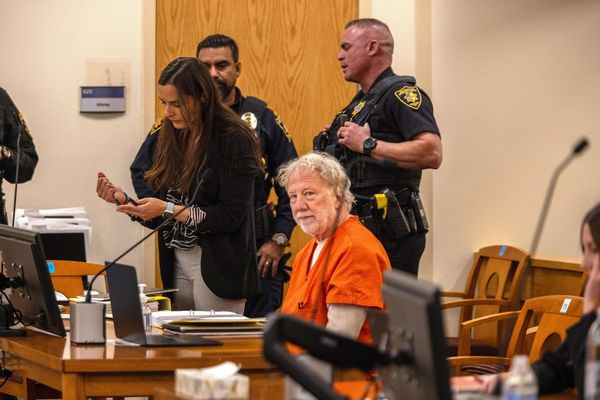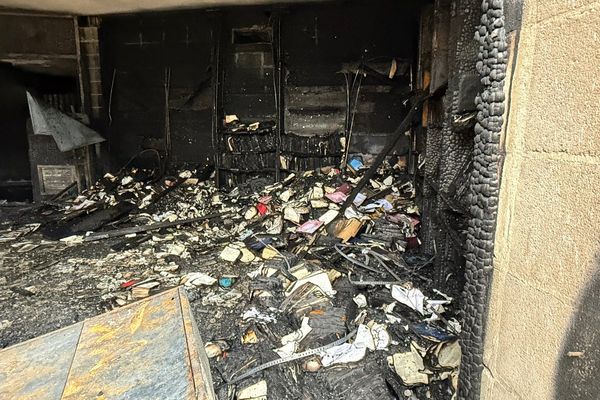
The Voice to Parliament referendum marks the first time that the Australian Electoral Commission (AEC)’s “remote voter services” in the Northern Territory have extended to town camps in Mparntwe (Alice Springs).
The 13 pop-up polling services were all overseen by Indigenous man Geoffrey Angeles, but due to a lack of “media training”, the AEC would not let him speak about the positive influence his presence was having on the Indigenous vote.
Angeles told Crikey that, pending AEC permission, he’d be up for a yarn but the request for an interview was declined.
A quick Google of the supervisor (who was friendly, forthcoming and afforded Crikey the standard introductions of a name) showed he is no stranger to the media. Angeles appeared as a guest on ABC’s Poh’s Kitchen, hosted his own cooking show on SBS National Indigenous Television, and has done extensive work as a university lecturer.
Instead of the on-ground manager of town camp polling, the AEC offered an interview with a Darwin-based senior engagement officer in the Indigenous Engagement and Participation Program (IEPP). It said that although this person was not present for any town camp voting over the past two weeks, they’d “played a crucial role in getting the town camp service off the ground”. However, the officer was not available for an interview in the two days before deadline and the AEC was not able to put forward anyone else.
The AEC told Crikey that the 2,652 Indigenous-identifying employees — although up from the 2022 federal election — accounted nationally for only 2.65% of its referendum workforce. Locally in Alice Springs, a total of 10 First Nations staff were involved in mobile voting teams.
Of the 18 town camps in Alice Springs — the majority serviced and governed by Tangentyere Council — 13 were visited by an AEC voting service. These town camps were originally set up as bases for communities to come into Alice Springs and access services, but they have since morphed into culturally distinct permanent Aboriginal suburbs.
In the absence of permission to talk to Angeles, Crikey played observer, witnessing the very different way the official engaged with voters and campaigners in a culturally sensitive and appropriate manner (in contrast to other AEC remote voter service teams). This included conversations that jumped between multiple Indigenous languages.
“You mob keep your six metres,” Angeles called out to Yes23 campaigners who’d set up shop near the polling booth, while simultaneously fielding questions from town camp residents about how to vote or what to vote for.

The answers — when in English — were put in simple terms stripped of bureaucratic language: “That’s up to you, you can vote either Yes or No. That’s your choice. We’re electoral officers so we can’t tell you what to write.”
These voting services were scheduled for a short one hour per town camp, but Angeles did not run a tight 60-minute ship. There was time and space permitted to ensure everyone in the town camp who wanted to vote was given the opportunity to.
That said, much like the remote voter service in communities, many residents (and service providers present) were still unaware that the vote was scheduled for that day.
A spokesperson for the AEC told Crikey that it had advertised the polling time, date, and place of town camp voting through “newspapers, radio, social media and television, posters and through community contacts,” with much community consultation taking place in the lead-up to its service.
Inside Ilyiperenye (Old Timers) on Wednesday, October 11, AEC officials were recognisable in their purple vests (yellow for the supervisor). There was the stock-standard cardboard polling booth set up in the centre of the town camp next to a barbeque (courtesy of Tangentyere Council), but no AEC signage.
Also present in the town camp was an NT housing representative (although they told Crikey they were there under the assumption there was an annual general meeting taking place — the referendum vote was news to them) and a Yes campaigner.
The locations and times of town camp pop-up polling booths were listed on the AEC’s website, lumped in with remote communities as part of its remote voter services.
There were six town camps listed under the “Alice Springs” locality — Anthepe, Illparpa, Ilyiperenye (Old Timers), Mount Nancy, Mpwetyerre (Abbots), and the non-Tangentyere town camp Ilpeye Ilpeye — with Indigenous or English names of the town camps listed under the second “polling place” column. The remaining seven town camps are classed by either their English or Indigenous names for both locality and polling place — Anthelk Ewlpaye (Charles Creek), Ewyenper Atwatye (Hidden Valley), Ilperle Tyathe, Inarlenge (Little Sisters), Karnte, Nyewente (Trucking Yards), Yarrenty Altere (Larapinta Valley).
A spokesperson for the AEC said that discrepancies in the locations of town camps was due to a mix of old and new formatting, a mix-up of metropolitan and remote labelling, and the absence of an established system on how to list town camps.
“When the new town camps were added they were put in using the same conventions as we have used for our remote polling locations and have essentially been entered as a remote community,” it told Crikey.
The AEC said that it recognised the website display “may be confusing for some voters to understand” and would endeavour to improve it for the next round of voting services.
Tangentyere Council did not respond to repeated requests for comment on the extent of consultations between them and the AEC, their take on the nominated town camps, and whether the one-hour voting window was enough.
Graeme Smith, CEO of Lhere Artepe, the registered and recognised body representing Native Title Holders of Alice Springs, told Crikey that the timeframe was “ridiculous”.
“What if they work, what if they’re in hospital? Once again, rustle us up, put us through the yards, do it as quick as possible. One hour is not acceptable,” he said, adding that Indigenous people in town camps who missed their designated hour were — based on history — unlikely to get themselves to another polling booth.
“We’re not used to this Western system of voting. This system was introduced upon us and they’re expecting us to understand it with one hour to vote. ‘Stuff that, I’ve got something else to do in that one hour of the day. If I have to go to Santa Theresa because of Sorry Business, I’m not voting.’ That’s our mentality, that’s the way we think. ‘If you come to me, I’ll vote’.”
Smith said that the AEC and others “running the show” needed to figure out how best to get the vote from the Indigenous population and stop expecting Indigenous people to make the effort for them. He suggested a phone call or an email with himself would be a good place to start.
“I’ve not heard from them at all. If I had, I’d be asking them all these questions you’re asking me now. We’d be having a say in where they are and how long they’re open. We’d be asking how these mob are getting around to vote? We’d be asking the question of interpreters. That’s what we’d be discussing if they chose to engage us and seek our opinion on this,” Smith said, adding that the “it’s remote” excuse had been the government’s go-to for the past 20 or 30 years.
“We still have standards here and the electoral commission for me are lowering standards.”







